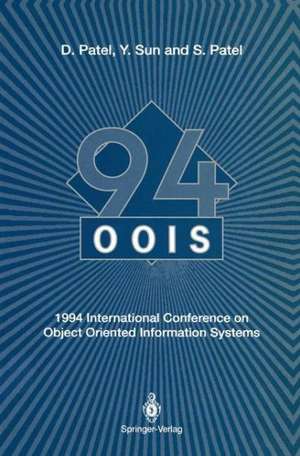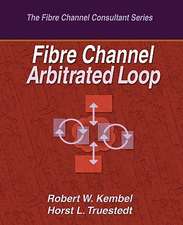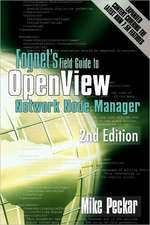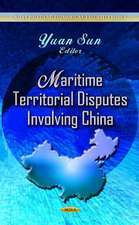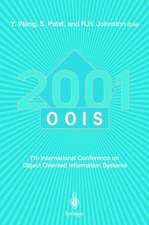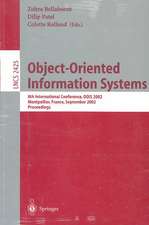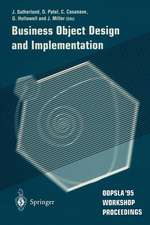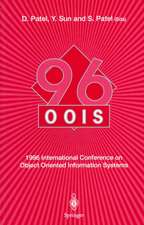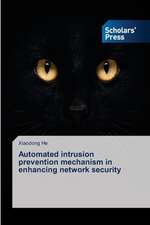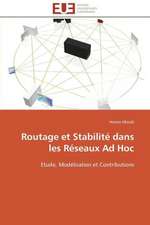OOIS’94: 1994 International Conference on Object Oriented Information Systems 19–21 December 1994, London
Editat de Dilip Patel, Yuan Sun, Shushma Patelen Limba Engleză Paperback – 12 ian 1995
Preț: 343.62 lei
Preț vechi: 429.52 lei
-20% Nou
Puncte Express: 515
Preț estimativ în valută:
65.75€ • 68.65$ • 54.29£
65.75€ • 68.65$ • 54.29£
Carte tipărită la comandă
Livrare economică 15-29 aprilie
Preluare comenzi: 021 569.72.76
Specificații
ISBN-13: 9783540199274
ISBN-10: 3540199276
Pagini: 524
Ilustrații: XIV, 506 p. 22 illus.
Dimensiuni: 155 x 235 x 28 mm
Greutate: 0.73 kg
Ediția:Softcover reprint of the original 1st ed. 1995
Editura: SPRINGER LONDON
Colecția Springer
Locul publicării:London, United Kingdom
ISBN-10: 3540199276
Pagini: 524
Ilustrații: XIV, 506 p. 22 illus.
Dimensiuni: 155 x 235 x 28 mm
Greutate: 0.73 kg
Ediția:Softcover reprint of the original 1st ed. 1995
Editura: SPRINGER LONDON
Colecția Springer
Locul publicării:London, United Kingdom
Public țintă
ResearchDescriere
This volume contains the papers presented at the Intemational Conference on Object Oriented Information Systems 00lS'94, held at South Bank University, London, December 19 - 21, 1994. In response to our call for papers, a total 85 papers from 24 different countries were submitted. Each paper was evaluated by at least two Program Committee members and an additional reviewer. Together, we selected 41 papers for presentation at the conference and inclusion in the Proceedings. Also included are the keynote addresses by Peter Gray and Michael Jackson. The other submissions were recommended for presentation in the poster sessions. Peter Gray, our invited speaker, evaluates the problems of object-oriented systems and data independence by looking at how object oriented database applications are failing to perceive its benefits, and instead rely too much on encapsulation. He suggests alternative kinds of object storage to preserve data independence. The second invited speaker, Michael Jackson describes a way of solving problems, by focusing directly on the problems themselves, their components and structures and on the relationships between the problem and the solution method. He discusses a particular view of the role of object-orientation in software development.
Cuprins
Keynote Addresses.- Object-Oriented Systems and Data Independence.- Problems, Descriptions, and Objects.- Modelling.- Formalising Actors in Linear Logic.- Objects Versus Functions in User-Validation of Requirements: Which Paradigm Works Best?.- M — An Object-Oriented Model and Method Base System for Discrete Optimization Problems.- Modelling Events in Object-Oriented Analysis.- An Object-Oriented Design for Modelling Business Rules in Resource Allocation Jobs.- Relational Implementation of Object Oriented Information System Design Using a Generic Model.- Object-Oriented Modelling and Simulation of an Expert System for Monitoring and Control of a Water Distribution System.- Reusing and Retrieving Software Components: An Object- Oriented Domain Analysis Approach.- Specification and Implementation of the Transmutation Concept.- OPUS: A Calculus for Modelling Object-Oriented Concepts.- MON: An Object Relationship Model Incorporating Roles, Classification, Publicity and Assertions.- Knowledgebases.- Objects with Views and Constraints: From Databases to Knowledge Bases.- An Integrated Expert Database System.- Generic Methods in Deductive Object Databases.- Software Development.- Development of an Intelligent Object-Oriented CASE Tool.- Identifying Internal and External Characteristics of Classes Likely to be Useful as Structural Complexity Metrics.- An Application Sensitive Repository Search Technique.- Interface Design.- GOMI: A Graphical User Interface for Object-Oriented Databases.- A Layered Approach to Dedicated Application Builders Based on Application Frameworks.- An Abstract Definition of Graphical Notations for Object- Oriented Information Systems.- Object Databases.- The OODB Ownership Relationship.- Function Materialization in Object-Oriented Databases.- Safe Derivations in Object Hierarchies.- Distributed Database Systems.- Jupiter/MDD: The Jupiter Interoperator Multidatabase Dictionary.- Building Component Schemata of a Heterogeneous Federated Database with the IFO2 Model.- Integrating Distribution and Mobility into an Object-Oriented Database.- Schema Evolution and Active Data.- From Conceptual Specification to Object Oriented Design.- Identifying the Requirement for History of Time-Varying Objects During an Object-Oriented Analysis.- Integrity Constraints in an Object Oriented Information System.- Hypermedia.- HyperMART: Hypermedia and Multimedia Authoring and Rendering Tool.- Actor Management in Documentary Applications.- Support Systems for Cooperative Edition of Multimedia Documents.- Operating Systems and Languages.- A Declarative Extension of IDL-based Type Definitions within Open Distributed Environments.- Choosing Conceptual Objects-the Y++ Approach.- NET/C: Toward the Fine Grained UNIX-like OS.- Methodology and Design.- Dynamic Implementation of Composite Objects in ACSE Project.- An Algorithm for IS_A Hierarchy Derivation.- Embedding Strategic Information into an Object-Oriented Analysis and Design Method.- Object-Oriented Databases and Applications.- Design of an Academic Personal Information Manager Using an Object-Oriented Database Approach.- Towards Object-Oriented Textual Databases.- Application-Specific Benchmarks for Object Databases: A Multiple-Case Study Approach.- Author Index.
